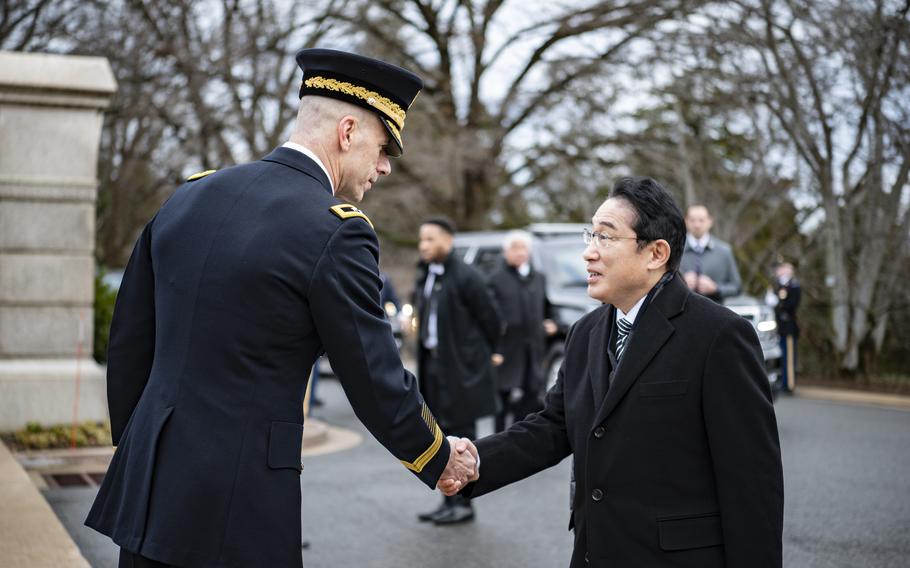
Maj. Gen. Allan M. Pepin greets Japanese Prime Minister Fumio Kishida at Arlington National Cemetery, Arlington, Va., on Jan. 13, 2023. (Elizabeth Fraser/Arlington National Cemetery)
TOKYO — A trilateral alliance between the United States, Japan and South Korea could become the most important form of military cooperation in the Indo-Pacific, according to a South Korean security expert.
U.S. President Joe Biden, Japanese Prime Minister Fumio Kishida and South Korean President Yoon Suk Yeol are scheduled to hold their countries’ first ever trilateral summit at the Camp David, Md., presidential retreat on Friday.
The three are expected to announce details of a pact covering intelligence sharing, supply chains and cybersecurity, the Wall Street Journal reported Wednesday, quoting unnamed officials.
The agreement will also cover ballistic-missile defense cooperation and joint military exercises.
The countries will launch early warning systems to protect supply chains, including semiconductors and advanced technology security, and establish new cybersecurity initiatives, the newspaper reported.
Japan and South Korea, which together host more than 80,000 U.S. troops, share concerns about China’s vast military buildup and North Korean nuclear weapons and missile tests.
“I think US-ROK-Japan trilateral is gearing towards the most important minilateralism in the Indo-Pacific,” Kim Hyun Wook, an American studies professor at Korea National Diplomatic Academy in Seoul, said in an email Thursday. ROK refers to Republic of Korea, the formal name for South Korea.
Minilateralism involves an exclusive group of nations with a direct stake in an issue working together.
The three countries at the Camp David summit have many common interests, Kim said.
“Japan and Korea need it (the alliance) in order to upgrade their security readiness vis-a-vis North Korea and China,” he said. “So there are more pros than cons on it.”
The U.S. already has security agreements with Japan and South Korea that involve security guarantees and mutual defense assistance in the event of one or both being attacked.
The difference with a new three-way pact would be the Japan-South Korea side of the triangle, Paul Buchanan, a U.S. security expert based in New Zealand, said in an email the same day.
“The exercises may establish a precedent for standardizing Japan-ROK operational protocols and [working together] under or along with a US umbrella. Same goes for the intelligence sharing,” he said.
A pact between the three would represent the innermost picket line of the “fence-ringing project” for China and North Korea, he said, but it wouldn’t likely resemble the NATO alliance.
The big difference is likely to be that, unlike NATO, the trilateral pact with the U.S. may lack the NATO collective defense clause between Japan and South Korea, he said.
“In other words, Japan and ROK will not automatically come to each other’s defense via the invocation of a specified clause in the pact, but instead rely on the US umbrella guarantee when that needs to happen.”
A NATO-style defense pact involving the three nations would have significant advantages, James Brown, an international affairs expert at Temple University’s Japan campus, said by email Thursday.
“By strengthening the security of both Japan and ROK, it would have a deterrent effect on China and North Korea,” he said.
However, Brown predicted that such an alliance is unlikely due to historical tensions between South Korea and Japan. The two countries have been at odds over issues related to Japan’s occupation of South Korea during the first half of the 21st century.
“Another problem is that Japan cannot yet offer the type of security guarantees that underpin NATO,” he said. “NATO works on the basis of mutual security commitments. Japan, however, is constitutionally restricted to only being able to use armed force if its own security is in peril. Japan cannot fight just to protect others.”